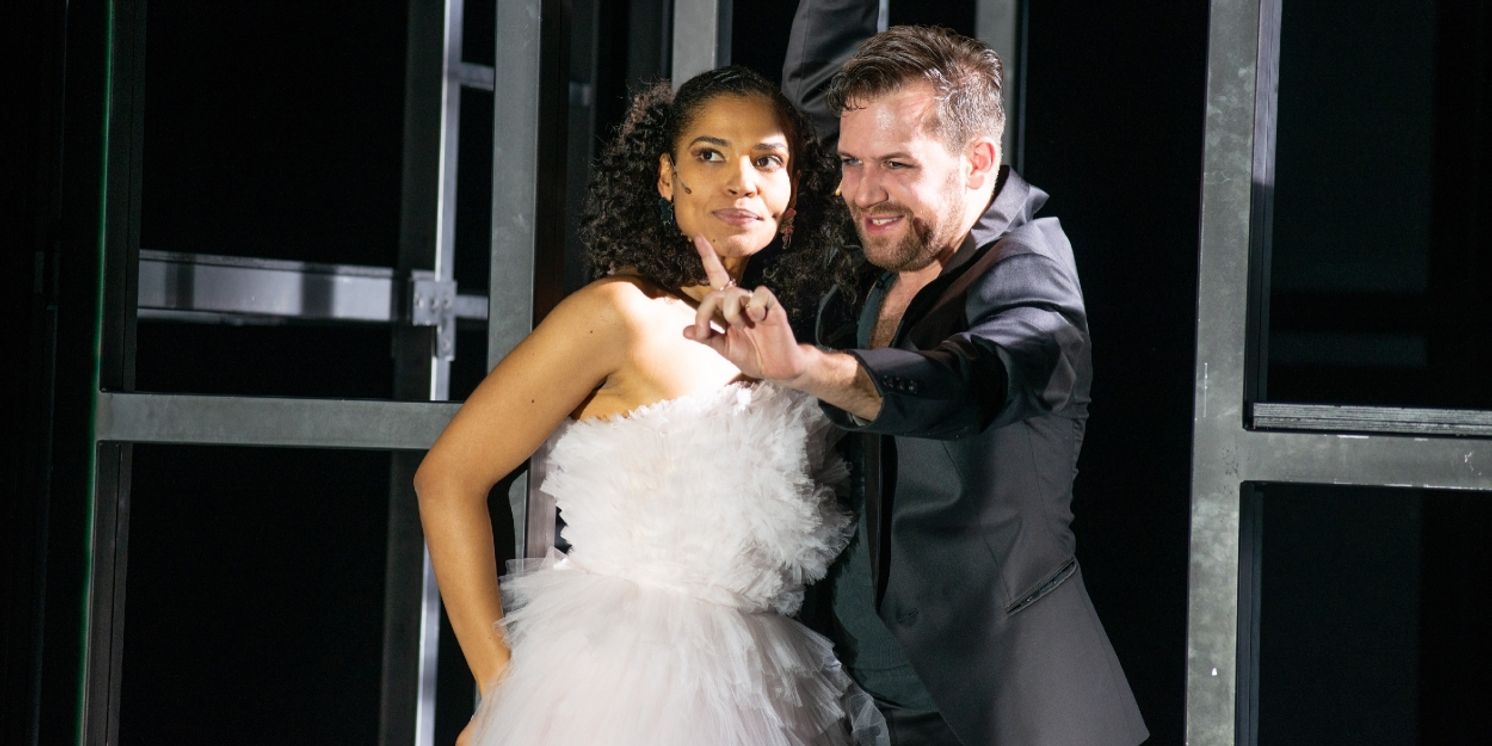Review: THE THREEPENNY OPERA – ADELAIDE FESTIVAL 2024 at Her Majesty's Theatre, Adelaide Festival Centre
Barrie Kosky's reworked version of the Brecht and Weill play with music.

Reviewed by Barry Lenny, Thursday 7th March 2024.
It has been quite a few years since I last saw a production of Die Dreigroschenoper, The Threepenny Opera, so I had been looking forward to this performance by the Berliner Ensemble, under the direction of Barrie Kosky. Unfortunately, seated in the Dress Circle I either had to look at the stage through the bottom of my glasses, the reading section, seeing a blurred performance, or sit with my chin rammed into my chest to be able to see through the top of the glasses, the distance section. Ultimately, it didn’t matter, as the head of the person who sat in front of me completely blocked my view of centre stage, even to halfway up the set. As most of the action was positioned centre stage, I saw almost nothing of the performance. My advice is, if you wear multi-focal glasses, particularly if you have very strong prescription lenses, always book tickets in the stalls. My review, therefore, can only relate to what I heard.
Surtitles for foreign language productions are usually projected above the stage, where quickly lifting and lowering the eyes ensures that nothing of the performance is missed. For some reason, screens were placed well offstage to either side, necessitating turning one's head away from the stage, and from the performance. During a song, with constant interpretation being shown, there was no time to look at the stage.
Written by Bertolt Brecht and Elisabeth Hauptmann, with music by Kurt Weill, and described as a play with music, it is almost a century since its premiere in Berlin in 1928. Hauptmann was Brecht’s lover at the time and translated John Gay’s The Beggar’s Opera from English into German for him to read. That work dates to 1728, two centuries before this one. It is generally considered that she had little, if anything, to do with Brecht’s libretto. Her name is often omitted. As well as his own writing, Brecht used four songs by the French poet François Villon. using the translations by K. L. Ammer. Kurt Weill’s music for a small group of musicians, drawing on jazz and German dance music of the period, is perfectly suited to the subject matter, the sleaziness and degradation of late Georgian period Soho. The final scene takes place on Thursday, 28th June 1838, the day of Queen Victoria’s coronation.
It begins with a prologue, originally a street singer singing Die Moritat von Mackie Messer, The Ballad of Mack the Knife, undoubtedly the best-known tune in the production, and recorded by a good many singers. In this case, it is sung by a disembodied head poking through a curtain of silver strips, the Moon Over Soho, delivered well by Dennis Jankowiak,
Jonathan Jeremiah Peachum, sung with an air of command, tinged with menace, by Tilo Nest, who is assisted by his wife, Celia, given a femme fatale treatment by Constanze Becker, controls all of the begging in Soho through his business, The Beggar’s Friend. He dresses and trains the beggars and they pay him a percentage of what they make. Filch, sung by Gabriel Schneider, whose location during the scene I was unable to determine but presumably behind the curtain, was working as a beggar outside of Peachum’s system and violently brought into line.
Peachum is angry when his daughter, Polly, sung with defiance and wilfulness in her delivery by Cynthia Micas, doesn’t come home one night and he guesses that she has fallen for the notorious criminal, Macheath (Mackie Messer), Gabriel Schneider oozes charm in the role, easily convincing the audience that he could have charmed all of the young women around him, despite his murderous career. Having only known him for five days, Polly and Macheath go through a mock wedding. She entertains the company by singing Seeräuberjenny, Pirate Jenny, another song that has been recorded by numerous artists.
Peachum appeals to Jackie ‘Tiger’ Brown, powerfully sung by Kathrin Wehlisch in drag king mode, the corrupt police chief, wanting Macheath arrested and hung, unaware that Brown is best friends with Macheath from their army days in India. Brown’s pregnant daughter, Lucy, sung by Laura Balzer, bringing out the jealousy and antagonism against her rival, Polly, already claims to be Macheath’s wife.
The resilient and self-reliant prostitute, Jenny (Spelunkenjenny), one of Macheath’s past lovers, whom he still visits occasionally, is sung by Julia Berger, with a degree of resignation to her circumstances. She is bribed by Mrs. Peachum to turn him in to the police, but, having done so, is then denied the promised money after he escapes again. The role was first sung by Lotte Lenya, Weill’s wife.
Brown is eventually forced to arrest Macheath. Just as he is about to hang, a messenger arrives from Queen Victoria, who is celebrating her coronation, announcing, in the most bizarre deus ex machina, that not only has he been pardoned, but has also been given the title of Baron, as well as a castle and a pension for life.
The others in the ensemble, all of whom have distinctive voices, fill various roles during the performance.
Musical Director, Adam Benzwi, has control of an exceptionally fine group of musicians, making Weill’s complex score sound simple. It is not. The set design by Rebecca Ringst is a skeletal structure of steps, ladders, platforms, and trapdoors that the cast has to climb and crawl over, dressed in a varied range of modern costumes by Dinah Ehm, all effectively lit by Ulrich Eh.
Photography, JR Berliner Ensemble.
Reader Reviews
Videos

